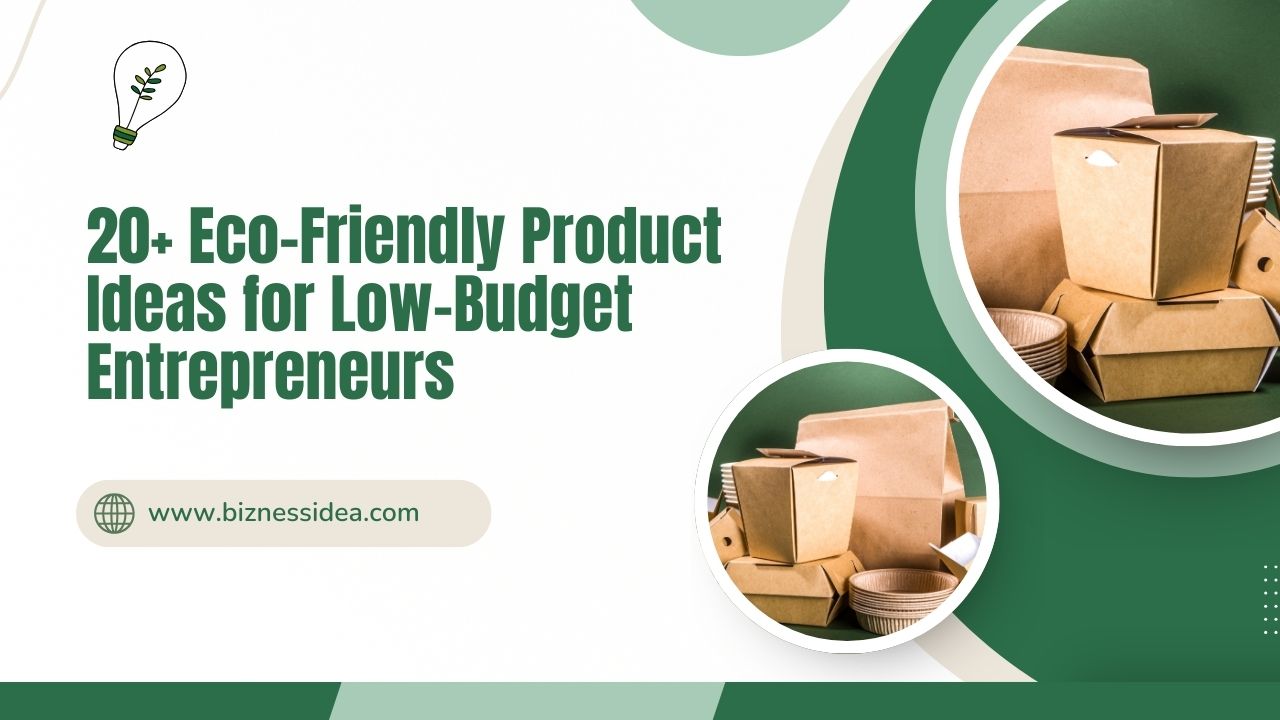Sustainability is no longer a trend—it is a necessity in 2025. With rising awareness about climate change and waste management, consumers are shifting toward eco-conscious brands. This opens immense opportunities for entrepreneurs, especially those starting with a small budget. By creating eco-friendly products, you not only tap into a growing market but also make a positive contribution to society. This article highlights 20+ eco-friendly product ideas for low-budget entrepreneurs. You’ll also learn the benefits of going green, how to market these products effectively, and common mistakes to avoid while building your sustainable business journey.
Why Eco-Friendly Businesses Are Booming in 2025
In 2025, eco-friendly businesses are thriving due to rising consumer demand for sustainable living solutions. Consumers actively seek brands that reduce plastic waste, conserve resources, and use ethical production methods. Green startups are gaining traction because customers trust businesses that align with their environmental values. The growth of e-commerce platforms has also made it easier for entrepreneurs to sell eco-friendly product ideas online with minimal capital. With increasing support from governments and NGOs, the eco-friendly industry is expected to grow at double-digit rates, making this the perfect time for low-budget entrepreneurs to launch green startups.
Key Benefits of Starting an Eco-Friendly Business on a Budget
Starting an eco-friendly business doesn’t always require heavy investments. In fact, many sustainable product ideas utilize natural or recycled materials that are both affordable and readily available. Such businesses enjoy low manufacturing costs and high scalability. Eco-conscious branding also builds strong trust among customers, making it easier to retain loyal buyers. Social responsibility enhances brand credibility and opens doors to collaborations with green marketplaces. Additionally, as governments push for plastic bans and waste reduction, eco-friendly brands automatically gain relevance. For low-budget entrepreneurs, eco products provide a long-term opportunity to build a sustainable and profitable business model.
20 Profitable Eco-Friendly Product Ideas for Low-Budget Entrepreneurs
Bamboo Toothbrushes and Cutlery
Bamboo-based products are gaining immense popularity as alternatives to plastic. Bamboo toothbrushes and reusable cutlery sets are lightweight, affordable, and biodegradable. Entrepreneurs can source raw bamboo locally or from wholesalers at low costs. These products cater to eco-conscious families, travelers, and office-goers. The demand continues to grow as single-use plastics face stricter bans. By offering customized designs and eco-friendly packaging, entrepreneurs can enhance brand appeal. Selling bamboo cutlery sets in eco-friendly kits also increases profits while supporting sustainability. This simple product idea has already become a bestseller in many global green marketplaces, proving its long-term viability.
Reusable Cotton Grocery Bags
Plastic bans worldwide have made reusable cotton bags a necessity. They are inexpensive to produce, washable, and durable, making them an ideal replacement for single-use plastic bags. Entrepreneurs can start small by sourcing plain cotton bags and customizing them with eco-friendly prints or branding. Local artisans and small manufacturers can help with stitching, allowing for flexible production. These bags are widely accepted by supermarkets, grocery stores, and eco-conscious consumers. With the right designs, entrepreneurs can target both daily users and businesses. Selling multipurpose sets of different sizes increases market appeal while keeping costs budget-friendly.
Handmade Organic Soaps
Organic soaps made from natural oils, herbs, and essential oils are in huge demand due to rising skin-care awareness. Unlike chemical-based products, handmade soaps are safe, eco-friendly, and biodegradable. Entrepreneurs can easily start soap-making at home with small investments in molds, oils, and fragrances. Unique blends such as aloe vera, charcoal, or coffee-based soaps can be marketed to niche audiences. With eco-friendly packaging like paper wraps or jute pouches, these soaps make attractive gifts as well. Selling through local markets, organic shops, and e-commerce platforms ensures steady revenue while promoting sustainable skincare solutions.
Compostable Food Containers
Restaurants, food delivery services, and catering businesses are adopting compostable food containers as eco-friendly alternatives to plastic. These containers, made from bagasse, cornstarch, or bamboo fiber, decompose naturally without harming the environment. Entrepreneurs can partner with local suppliers or distributors to start selling these containers at wholesale or retail levels. With rising regulations against plastic packaging, the demand for compostable containers is growing rapidly. A small budget is sufficient to start this venture since containers can be purchased in bulk and resold profitably. Offering customizable branding for restaurants adds a revenue stream.
Recycled Stationery Products
Eco-friendly stationery items like recycled notebooks, pens, and pencils are perfect for students, professionals, and corporate gifting. These products reduce paper waste while providing affordable options for everyday use. Entrepreneurs can collaborate with paper recycling units or handmade paper manufacturers to design unique stationery sets. The demand for sustainable stationery has grown in schools and offices that aim to promote eco-conscious habits. By offering corporate branding on recycled notebooks or pens, entrepreneurs can target bulk orders. Selling online through eco-friendly marketplaces and subscription models ensures recurring income while keeping production costs low.
Beeswax Wraps for Food Storage
Beeswax wraps are a sustainable replacement for plastic cling films. Made from cotton cloth coated with beeswax, resin, and natural oils, these wraps preserve food freshness while being reusable and compostable. Entrepreneurs can easily make beeswax wraps at home using simple DIY techniques. They can be sold in different sizes as eco-friendly kitchen essentials. With growing awareness about zero-waste living, beeswax wraps have a strong niche market. Attractive packaging and eco-conscious branding can boost customer interest. Selling combo packs with different patterns and colors also creates value while keeping startup costs minimal.
Sustainable Fashion Accessories (Hemp, Jute, etc.)
Fashion-conscious consumers are increasingly looking for accessories made from natural fibers like hemp, jute, and organic cotton. Products such as handbags, wallets, belts, and scarves can be crafted sustainably at low costs. Entrepreneurs can collaborate with local artisans to create unique handmade designs. These accessories not only replace synthetic materials but also offer premium value due to their eco-friendly appeal. Selling through online fashion platforms and eco-stores opens wider markets. By focusing on sustainable fashion branding, entrepreneurs can target both eco-conscious youth and international buyers. This segment holds huge long-term growth potential.
Eco-Friendly Cleaning Products
Eco-friendly cleaning products made from natural ingredients like vinegar, baking soda, and essential oils are gaining popularity as safe household alternatives. Entrepreneurs can produce liquid cleaners, laundry detergents, and dishwashing soaps with minimal investment. These products appeal to families concerned about chemical exposure and environmental harm. By using refillable bottles and biodegradable packaging, businesses can further enhance sustainability. Marketing through social media tutorials and demos helps build trust among customers. Selling subscription packages for monthly household cleaning kits creates recurring revenue. This business offers great scalability while contributing to healthier homes and environments.
Solar-Powered Gadgets (Small-Scale)
Small-scale solar-powered gadgets like lamps, chargers, and fans are increasingly sought after in energy-conscious markets. Entrepreneurs can start by sourcing affordable solar devices from suppliers and reselling them at reasonable margins. These products are especially popular in rural areas with inconsistent electricity supply and among eco-conscious urban customers. With rising energy costs, solar gadgets provide practical, long-term savings for users. Entrepreneurs can also explore DIY solar lamp kits as educational products for schools. Offering warranty and customer support ensures credibility and trust, making solar gadgets a smart, eco-friendly business venture.
DIY Upcycled Home Decor
Upcycled home décor products allow entrepreneurs to turn waste materials into valuable art pieces. Old wood, glass bottles, tin cans, and fabric scraps can be creatively transformed into lamps, wall hangings, or planters. This not only reduces waste but also creates unique, handmade items with strong aesthetic appeal. Entrepreneurs can start by showcasing DIY projects on social media to attract customers. Local exhibitions, flea markets, and eco-stores are great selling channels. Since raw materials often come from discarded items, production costs remain extremely low. This business combines creativity with sustainability for excellent profitability.
How to Choose the Right Sustainable Product for Your Business
Choosing the right eco-friendly product depends on thorough market research. Entrepreneurs should study consumer demand, existing competition, and gaps in the market. The cost of raw materials plays a major role in deciding which product to start with. Lightweight and low-maintenance products like reusable bags or soaps are easier for beginners. Entrepreneurs must also evaluate manufacturing feasibility—whether the product can be produced at home, outsourced to artisans, or bought wholesale. Ultimately, the right product balances affordability, scalability, and consumer demand. Sustainable product ideas for entrepreneurs succeed best when they align passion with practicality.
How to Market and Sell Eco-Friendly Products on a Budget
Use Social Media and Influencer Marketing
Social media is the most effective way to market eco-friendly product ideas with limited funds. Entrepreneurs can create educational and engaging content that highlights sustainability benefits. Collaborating with eco-conscious influencers helps reach a wider audience at a low cost. User-generated content and testimonials also build trust and brand credibility.
Sell on Green Marketplaces (Etsy, Ecoware, etc.)
Eco-friendly marketplaces such as Etsy, Ecoware, and Amazon Handmade are perfect platforms for selling sustainable products. These marketplaces already attract eco-conscious buyers, reducing the need for expensive marketing campaigns. Entrepreneurs can start small by listing a few products and scale up gradually.
Focus on Local & Minimalist Packaging
Eco-conscious buyers value brands that practice sustainability at every step, including packaging. Using recycled cardboard, jute pouches, or biodegradable wraps not only reduces costs but also strengthens brand image. Local packaging helps cut logistics expenses and ensures authenticity in branding.
Mistakes to Avoid When Starting a Green Product Business
Entrepreneurs often make the mistake of overpricing or underpricing eco-friendly products. Pricing should reflect both affordability and quality to attract repeat customers. Another major pitfall is greenwashing—making false claims about sustainability without genuine practices. This can severely damage credibility. Many beginners also ignore certifications like organic, cruelty-free, or biodegradable labeling, which add significant value. Without these, even good products may struggle to build trust. By avoiding these mistakes, low-budget entrepreneurs can ensure steady growth, long-term scalability, and loyal customer relationships in the eco-friendly industry.
Conclusion
Launching an eco-friendly business in 2025 is one of the smartest ways to combine profitability with social responsibility. From bamboo toothbrushes to upcycled home décor, each idea offers low investment requirements and long-term scalability. Success in this industry depends on understanding consumer demand, using affordable marketing strategies, and staying authentic to sustainable practices. Low-budget entrepreneurs now have a golden opportunity to contribute positively to the environment while securing financial independence. With determination, creativity, and eco-consciousness, you can build a thriving business that benefits both the planet and your entrepreneurial journey.
FAQs
Que 1. What is the cheapest eco-friendly product to start selling?
Ans. The cheapest eco-friendly products to start with are reusable cotton bags, handmade organic soaps, and beeswax wraps. These require minimal investment, can be made at home, and have high local demand.
Que 2. Can I start a green business with less than ₹10,000 / $100?
Ans. Yes, several eco-friendly product ideas, like recycled stationery, bamboo toothbrushes, and DIY upcycled home décor, can be launched with under ₹10,000 / $100. Starting small and selling locally helps keep costs low.
Que 3. Are sustainable products profitable in 2025?
Ans. Absolutely. With increasing consumer awareness and government policies favoring eco-friendly alternatives, sustainable products are highly profitable. Businesses that focus on quality, affordability, and authenticity have strong long-term potential.
Que 4. Do I need certifications to sell eco-friendly products?
Ans. Not always, but certifications such as organic, cruelty-free, or biodegradable can add value to your brand. They help build trust and give you a competitive edge in crowded marketplaces.
Que 5. Which eco-friendly product has the fastest-growing market?
Ans. Currently, compostable food containers, eco-friendly cleaning products, and sustainable fashion accessories are seeing the fastest growth due to high consumer demand and increasing bans on plastics.













